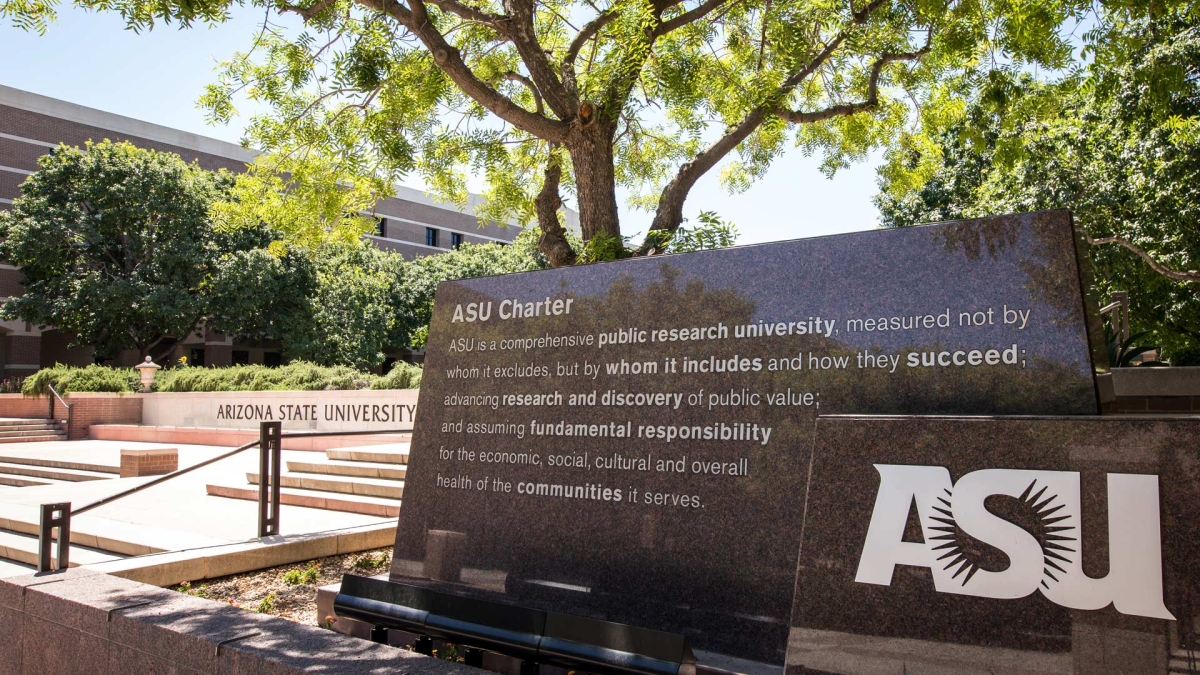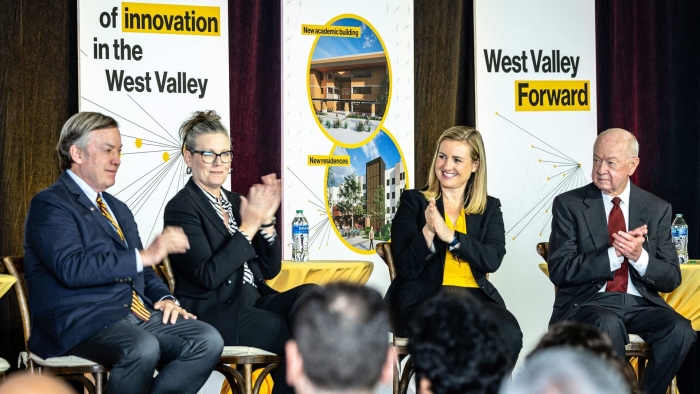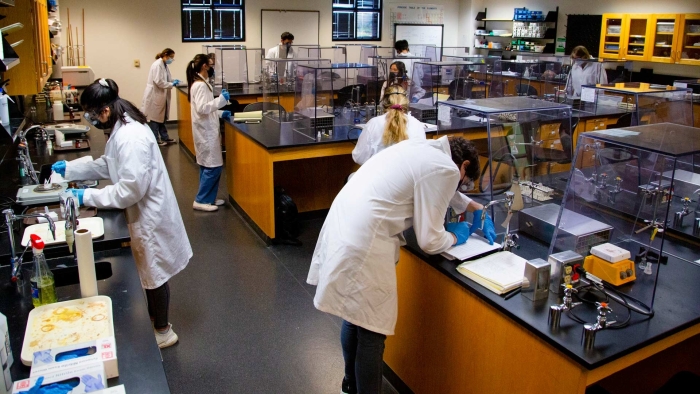Arizona Gov. Katie Hobbs recently expressed her excitement to a gathering of hundreds of people — including other state policymakers — about plans to add facilities and broaden science and engineering educational endeavors at Arizona State University’s West campus.
Hobbs said an expansion of academic programs and courses, along with related research and public outreach endeavors, will generate long-term benefits for growing West Valley communities in the greater Phoenix metro area, especially by boosting the local economy and encouraging industry expansion.
The Ira A. Fulton Schools of Engineering is playing a major role in elevating the learning opportunities and regional impacts of the ASU West campus by launching its first courses there this fall.
Students will have the opportunity to enroll in Entrepreneurship and Value Creation and Engineering Projects in Community Service, or EPICS, courses, as well as a computer science and engineering programming course for nonengineering majors.
These are foundational courses for engineering studies that focus on related knowledge and skills that can also be valuable for students majoring in a variety of academic disciplines, said Professor James Collofello, the Fulton Schools vice dean of academic and student affairs.
Pictured from left: Arizona State University President Michael Crow, Arizona Gov. Katie Hobbs, Phoenix Mayor Kate Gallego and Arizona Board of Regents member Larry Penley participated in the recent West Valley Forward event at the ASU West campus. Photo by Charlie Leight/ASU
“We want to provide courses that are going to reflect the value of education in engineering in many professions and in opening research and job opportunities in many other fields,” Collofello said.
The Fulton Schools will team with the New College of Interdisciplinary Arts and Sciences to stress the importance of students engaging in community service and other kinds of experiential learning to get the full benefits of higher education in almost any field, said Jeremy Helm, the Fulton Schools senior director of academic and students affairs.
The Fulton Schools plans to offer an undergraduate degree in engineering science that will include multiple concentrations within the field.
“The idea is that it would offer different flavors of engineering science,” Helm said. "For instance a concentration in business or an engineering science microelectronics concentration that will give students specialized advanced skills that high-tech industries are seeking.”
This new blueprint reflects Fulton Schools’ efforts to help give ASU West a forward-looking distinction in its academic approach. Centered in this blueprint is the establishment of the new School of Integrated Engineering, which will focus on providing students a strong foundation in math, science and engineering — with specializations in areas that are integral to the engineering industry, from business to technical roles.
“It’s all about the kind of education culture we want to develop,” Collofello said. “It’s integration as a guiding concept to create more opportunities by designing education in ways that engineering expertise can be incorporated into all kinds of businesses and industries, even those that are not primarily technical.”
Also included in this blueprint is Associate Teaching Professor Brent Sebold, the school’s Entrepreneurship and Innovation director, who will be bringing the Entrepreneurship and Value Creation course to the West campus and making it available to students in any academic program.
Whether he is working with faculty, staff, alumni or students, Sebold said his job is to help people adopt and develop an advanced entrepreneurial mindset.
“We want every single person affiliated with the Fulton Schools to be able to think and act like an entrepreneur,” Sebold said.
Students are pictured in an organic chemistry lab at the West campus. Photo by Chloe Merriweather/ASU
Sebold will be collaborating with Kristin Slice, director of community entrepreneurship for ASU’s J. Orin Edson Entrepreneurship + Innovation Institute, who works with business and community leaders to develop entrepreneurial ecosystems.
Slice will help Sebold guide students in shaping their own engineering and entrepreneurial mindsets, with the aim of devising solutions to real-world engineering challenges.
In the process, Sebold said he and Slice hope to see students be guided not solely by the profit potential of entrepreneurial ventures, but also by aspirations to produce positive societal impacts through their startups.
Fulton Schools Assistant Teaching Professor Adwith Malpe will be another key contributor to helping ASU West students immerse themselves in hands-on engineering education. He will be teaching the EPICS course, which involves students organizing teams to provide engineering solutions to meet local community needs.
“We already have connections to help us get students matched up with the people, organizations and resources to get EPICS projects off the ground,” Malpe said. “I’m looking forward to seeing students’ enthusiasm for opportunities to learn about engineering by applying it to solve existing problems.”
Beyond the three new courses coming to the West campus this fall, there are plans to bring even more in 2024.
“Not everything is in place yet, but we are primed to move forward in bringing more of what we offer at ASU’s other campuses to the West Valley,” Collofello said.
Along with engineering courses, Fulton Schools students will find resources to help them engage productively within the campus environment and in the surrounding communities.
Mitch Tybroski, ASU West campus associate director for student connection and community, helps to oversee activities and collaborations involving student groups and local organizations and municipalities.
“Our campus has a very welcoming culture and good rapport between students, faculty and staff,” Tybroski said. “I think engineering students coming here in the future will find a collaborative and encouraging educational experience.”
More Science and technology

ASU professor wins NIH Director’s New Innovator Award for research linking gene function to brain structure
Life experiences alter us in many ways, including how we act and our mental and physical health. What we go through can even change how our genes work, how the instructions coded into our DNA are…

ASU postdoctoral researcher leads initiative to support graduate student mental health
Olivia Davis had firsthand experience with anxiety and OCD before she entered grad school. Then, during the pandemic and as a result of the growing pressures of the graduate school environment, she…

ASU graduate student researching interplay between family dynamics, ADHD
The symptoms of attention deficit hyperactivity disorder (ADHD) — which include daydreaming, making careless mistakes or taking risks, having a hard time resisting temptation, difficulty getting…


